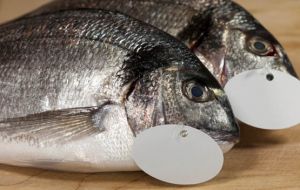MercoPress. South Atlantic News Agency
Conservationists claim seafood labelling ‘fails’ to support sustainable fishing
 The traditional choices of tuna, cod, salmon, prawns and haddock account for 90% of fish sales
The traditional choices of tuna, cod, salmon, prawns and haddock account for 90% of fish sales The Marine Conservation Society (MCS) has accused UK supermarkets of failing to label seafood in a way that makes it easy for consumers to select sustainable sourced fish. The allegation came as the MCS published the Good Fish guide, which is being hailed as the most comprehensive sustainable seafood advice released to date.
Advising consumers, industry, chefs and retailers on how to choose the most sustainable seafood, the guide offers alternatives to the traditional choices of tuna, cod, salmon, prawns and haddock.
MCS said that these five species account for 90% of fish sales, and that the figure should be reduced to 50 to 70% to protect stocks.
The organization argued that shoppers should be encouraged to buy less fashionable varieties such as pollack, gurnard, coley, dab and sprats.
The guide also reveals the best choices for traditional species such as farmed prawns, salmon, cold water prawns and Scottish North Sea haddock, which have been farmed organically or caught from sustainable or certified fisheries.
MCS aquaculture and fisheries program manager Peter Duncan said that poor and confusing labeling in supermarkets and fish shops make it difficult for customers to make the right choices.
Duncan urged retailers to adopt a traffic light system like those used to indicate a product's nutritional value.
“Sadly, the labeling of fish and fish products sold in supermarkets has not kept up [with other labeling schemes],” he said. “It is still virtually impossible to tell precisely where most fish and fish products have been caught.”
MCS has rated more than 150 fish from one to five based on the relative health status of each fish stock, and the sustainability of the various fishing methods used.
A rating of five is given to fish that MCS recommends not to eat because they are over-fished, vulnerable to exploitation, poorly managed or where methods of harvesting causes damage to the sea bed or by-catch, such as the capture of dolphins, sharks, seabirds and non-target fish.
However Andrew Opie, food director at the British Retail Consortium, defended the current labeling of seafood products, arguing that retailers are doing everything they can to support sustainable fishing.
“Supermarket customers are already told the species of fish they're buying, how it was caught and the region it came from - much more information than is provided by most of the catering industry” he told the BBC.
Opie also said it was difficult to define what constitutes 'sustainable' fishing because of varying criteria and changes in fish stocks.
“A raft of different interpretations among environmentalists lies behind much of the confusion, not the labeling provided by supermarkets,” he said.
Concerns over the sustainability of the fishing industry have been highlighted recently by celebrity campaigners, such as chef Hugh Fearnley-Whittingstall and his Fish Fight campaign which led to European Union ministers promising to tackle the problem.
The EU last week unveiled an innovative plan designed to limit the discarding of unwanted fish that also includes proposals to trial paying fishermen to catch plastic, rather than fish. If successful, the project would provide fleets with an alternative source of income to reduce pressure on dwindling fish stocks.




Top Comments
Disclaimer & comment rules-

-

Read all commentsThe individual labelling of wild-caught Atlantic salmon can be handled, but individually labelling sprats!!
May 10th, 2011 - 08:21 pm 0Order Whitebait, and get dozens of little labels stuck between your teeth ;-)
I don't know what they are talking about, there is lots of fish in the south Atlantic. enough to give lisences to fish to all of Asia, Africa, India and EU convined. I don't even think Chile or Argentine take from the ocean as much as Islas Malvinas Argentina illegaly occupyed by brits, I could be wrong but Pirats always bite more then they can chew.
May 19th, 2011 - 06:08 am 0Commenting for this story is now closed.
If you have a Facebook account, become a fan and comment on our Facebook Page!